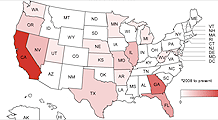What's killing banks on Main Street?
Bad loans are only one part of the problem; disastrous investments and risky funding sources have also helped to bring about the latest batch of bank failures.
NEW YORK (CNNMoney.com) -- On just about every Friday afternoon, bank regulators announce the latest batch of bank failures...they've shuttered 52 so far this year and the pace could well pick up.
Behind these causalities is a dangerous mix of risky funding techniques and loans to local businesses that simply went bad.
Most of the banks that have failed so far this year were ultimately done in by the large number of loans they issued to local residential and commercial real estate developers, who in turn were hit by the flagging economy.
For example, when Nevada's Silver State Bank failed last September approximately two-thirds of its entire loan portfolio consisted of real estate development and commercial construction loans.
Other banks simply succumbed to broader economic factors that were beyond their control. When milk prices suffered a steep decline earlier this year, many Colorado dairy producers found themselves unable to make good on their loan obligations, which only further squeezed ailing lender New Frontier. Regulators closed the Greeley, Colo.-based bank in April.
And with the commercial real estate market and small business sectors still struggling, some experts worry that the lenders that service them will be hit particularly hard in the months ahead.
"We are seeing more stress on the commercial real estate side than at the end of last year," said Karen Dorway, president and director of research at the bank rating and research firm Bauer Financial.
But it has not just been aggressive or ill-timed loans that have ruined many banks to date. The risky manner in which they funded their operations have also hit banks hard.
Many experts cite the industry practice commonly referred to as using "hot money," or brokered deposits.
These deposits come from other institutions looking to park their funds where they can get a nice return on their investment.
Banks, particularly ones that are looking to grow, like them because they are an easy way to get funds, which they can in turn use to issue more loans. But relying on hot money can be risky. It's an expensive source of funding and a volatile one, as brokers move their money from bank to bank seeking out the best returns for their customers.
Consider the case of Franklin Bank, a Houston-based lender that was seized by regulators last November. A report published this week by the FDIC's Office of Inspector General pointed out that the firm relied primarily brokered deposits in the months leading up to its failure.
Regulators have also become increasingly wary of banks' reliance on a similar practice in which banks take cash advances from the Federal Home Loan Bank system, a group of 12 government-sponsored banks that was created during the Great Depression to spur lending in small communities.
The practice, which is another way that banks can get funding to make more loans, has been trending higher in recent years. Last year, for example, the number of these advances issued to all U.S. banks and thrifts stood at $788 billion, up 45% from 2004 levels. And during the first three months of 2009 alone, banks have secured $697 billion in advances.
While relying on such money is commonplace in the banking industry, what worries regulators is that some lenders have become too reliant on these borrowed funds to maintain their everyday operations. In recent reports on several failed lenders, the agency's Office of Inspector General has also noted the advances have weighed on the bank's earnings.
Organizations that represent small banks maintain, however, that most community lenders -- which make up about 90% of the 8,200 banks and thrifts across the country -- are quite secure and continue to be a key source of credit for borrowers across the country.
But like their peers on Wall Street, some got tangled up in the deadly and complex financial instruments that felled banking giants.
Five Illinois-based lenders that were seized last week by regulators, for example, lost their footing after investing in collateralized debt obligations, those notorious investment products that became infamous last year after prompting billions of dollars in writedowns at firms like Citigroup (C, Fortune 500) and Merrill Lynch.
Recent reports have also suggested that same group of lenders, including Rock River Bank and First National Bank of Danville, also wagered on trust-preferred securities, another complex investment product used commonly throughout the industry as a means for banks to raise capital.
Many investors were lured in by the attractive dividends that these pooled securities offered. But as the housing market and the broader economy deteriorated, those payments dried up, prompting investors, including the five banks in Illinois, to take a hit, notes Bobby Schwartz, a partner at the law firm Smith, Gambrell & Rusell, whose practice has focused on representing financial institutions in the Southeast.
"It may hurt, but most financial institutions were not concentrated in this type of investment," he said. These investments weren't fatal for most community banks.
"In many of the cases," said Bauer's Karen Dorway, "it really has gone back to the loans."
Have you gone to a state or local government office only to find locked doors due to worker furloughs? Are you a public employee forced to take unpaid time off? How have furloughs affected you? We want to hear your experiences. E-mail your story to realstories@cnnmoney.com and you could be part of an upcoming article. For the CNNMoney.com Comment Policy, click here. ![]()


